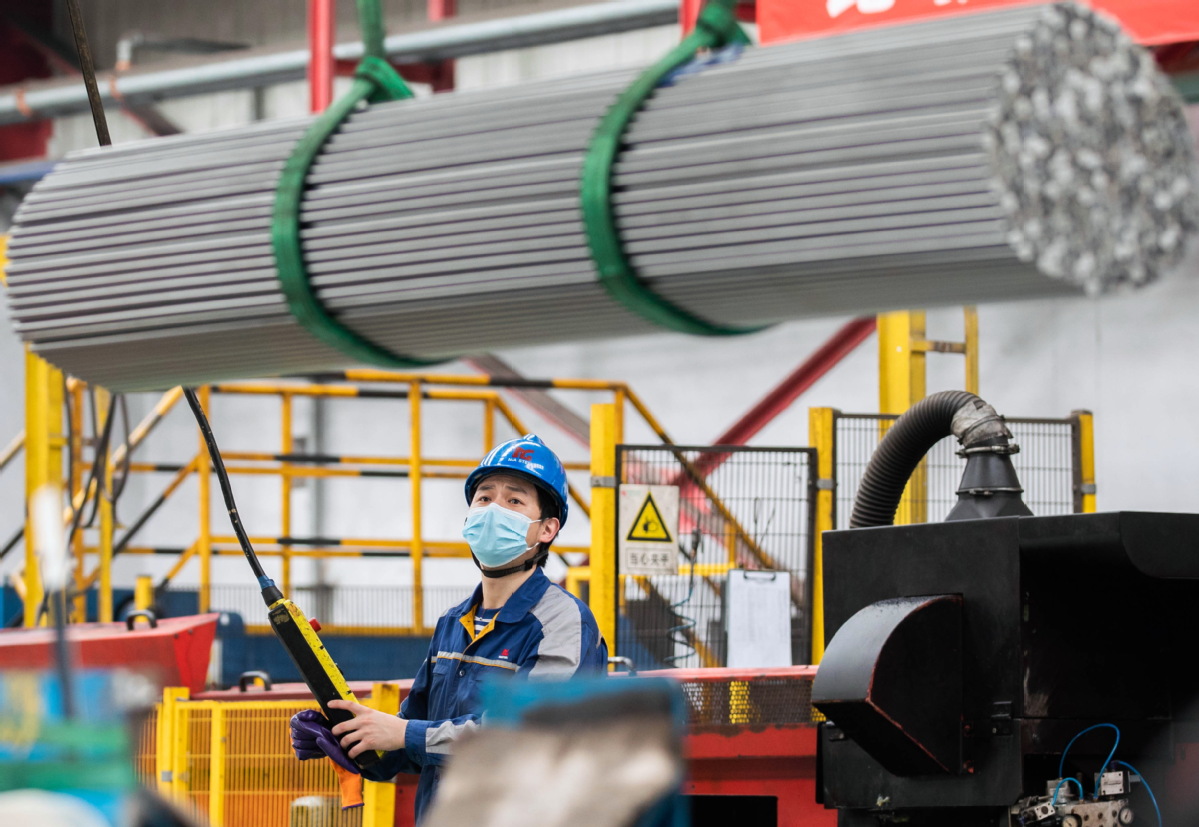Central SOEs to back emerging sectors, SMEs
 0 Comment(s)
0 Comment(s) Print
Print E-mail China Daily, April 20, 2022
E-mail China Daily, April 20, 2022
China will guide centrally administered State-owned enterprises (SOEs) to increase investment in key strategic emerging industries such as new energy and high-end equipment manufacturing this year, while enhancing business ties with small and medium-sized enterprises, said the country's top State-asset regulator on Tuesday.

To mitigate the impact caused by factors such as the COVID-19 pandemic and the Russia-Ukraine conflict, central SOEs will provide practical solutions to lower the operating costs of SMEs to facilitate their growth this year, said Peng Huagang, secretary-general of the State-owned Assets Supervision and Administration Commission of the State Council.
Addressing a news conference in Beijing, he stressed it is vital for central SOEs to carry out special actions to uphold the industry chain, and reinforce the coordination between the upstream and downstream businesses, and actively fuel the growth of SMEs.
Many central SOEs have already added more SMEs to their supplier lists. For instance, more than half of the 188 domestic suppliers in the supplier list of Shanghai-based Commercial Aircraft Corp, are SMEs.
Beijing-headquartered China General Technology (Group) Holding Co Ltd has established a list of 24 categories of key procurement materials, and many SMEs are its suppliers, especially in the area of machine tool manufacturing, SASAC data showed.
The SASAC also called on all SOEs that lease out their premises to SMEs and individual businesses in the services sector to exempt them from paying rent for up to six months, if they happen to be located in high-risk areas in late March.
As all the tasks of the Three-Year Action Plan (2020-22) for central SOEs will conclude this year, Peng said the government will take various measures to improve governance and value creative capabilities of listed SOEs, and make positive contributions to the stable growth of the capital market.
The Three-Year Action Plan is designed to implement measures outlined by the 19th National Congress of the Communist Party of China in late 2017 to push SOEs to adapt themselves to market-oriented and law-based rules and norms in the new era as soon as possible, and assume greater responsibility in an open and innovative environment.
The net profits of central SOEs grew by 13.7 percent year-on-year to 472.3 billion yuan ($73.9 billion) in the first quarter of this year, while their combined revenues soared 15.4 percent year-on-year to 9 trillion yuan, SASAC data showed.
For one thing, central SOEs provided high-quality services for the Beijing 2022 Olympic and Paralympic Winter Games, and helped fight the COVID-19 pandemic in the Hong Kong Special Administrative Region, Jilin province and Shanghai this year. For another, their crude oil output, electricity generation, coal production, sales of steel products and shipbuilding completion volume all registered year-on-year growth in the first quarter.
This will better help underpin China's overall economic development this year, said Liu Xingguo, a researcher at the China Enterprise Confederation in Beijing.
"The government had accelerated the pace of promoting strategic restructuring and business integration among select central SOEs since last year. This will help transform these groups into globally competitive corporations, and maintain the stability of industrial and supply chains."
For instance, in December, China Logistics Group Ltd, a new State-owned logistics conglomerate, was created by merging China Railway Materials Group Corp with four branches of China Chengtong Holdings Group Ltd.
Similarly, in the same month, China Rare Earth Group Co Ltd was founded through the transfer of rare earth assets of Aluminum Corp of China, China Minmetals Corp and the local government of Ganzhou in East China's Jiangxi province. This, experts said, is bound to increase production efficiency and enhance China's pricing power in the field of key rare earth minerals.






Go to Forum >>0 Comment(s)